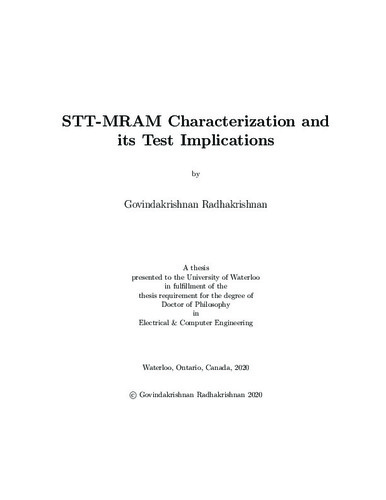| dc.contributor.author | Radhakrishnan, Govindakrishnan | |
| dc.date.accessioned | 2020-04-24 18:28:18 (GMT) | |
| dc.date.available | 2020-04-24 18:28:18 (GMT) | |
| dc.date.issued | 2020-04-24 | |
| dc.date.submitted | 2020-04-22 | |
| dc.identifier.uri | http://hdl.handle.net/10012/15786 | |
| dc.description.abstract | Spin torque transfer (STT)-magnetoresistive random-access memory (MRAM) has come
a long way in research to meet the speed and power consumption requirements for future
memory applications. The state-of-the-art STT-MRAM bit-cells employ magnetic tunnel
junction (MTJ) with perpendicular magnetic anisotropy (PMA). The process repeatabil-
ity and yield stability for wafer fabrication are some of the critical issues encountered in
STT-MRAM mass production. Some of the yield improvement techniques to combat the
e ect of process variations have been previously explored. However, little research has been
done on defect oriented testing of STT-MRAM arrays. In this thesis, the author investi-
gates the parameter deviation and non-idealities encountered during the development of
a novel MTJ stack con guration. The characterization result provides motivation for the
development of the design for testability (DFT) scheme that can help test and characterize
STT-MRAM bit-cells and the CMOS peripheral circuitry e ciently.
The primary factors for wafer yield degradation are the device parameter variation and
its non-uniformity across the wafer due to the fabrication process non-idealities. There-
fore, e ective in-process testing strategies for exploring and verifying the impact of the
parameter variation on the wafer yield will be needed to achieve fabrication process opti-
mization. While yield depends on the CMOS process variability, quality of the deposited
MTJ lm, and other process non-idealities, test platform can enable parametric optimiza-
tion and veri cation using the CMOS-based DFT circuits. In this work, we develop a DFT
algorithm and implement a DFT circuit for parametric testing and prequali cation of the
critical circuits in the CMOS wafer. The DFT circuit successfully replicates the electrical
characteristics of MTJ devices and captures their spatial variation across the wafer with
an error of less than 4%. We estimate the yield of the read sensing path by implement-
ing the DFT circuit, which can replicate the resistance-area product variation up to 50%
from its nominal value. The yield data from the read sensing path at di erent wafer loca-
tions are analyzed, and a usable wafer radius has been estimated. Our DFT scheme can
provide quantitative feedback based on in-die measurement, enabling fabrication process
optimization through iterative estimation and veri cation of the calibrated parameters.
Another concern that prevents mass production of STT-MRAM arrays is the defect
formation in MTJ devices due to aging. Identifying manufacturing defects in the magnetic
tunnel junction (MTJ) device is crucial for the yield and reliability of spin-torque-transfer
(STT) magnetic random-access memory (MRAM) arrays. Several of the MTJ defects result
in parametric deviations of the device that deteriorate over time. We extend our work on
the DFT scheme by monitoring the electrical parameter deviations occurring due to the
defect formation over time. A programmable DFT scheme was implemented for a sub-arrayin 65 nm CMOS technology to evaluate the feasibility of the test scheme. The scheme utilizes the read sense path to compare the bit-cell electrical parameters against known
DFT cells characteristics. Built-in-self-test (BIST) methodology is utilized to trigger the
onset of the fault once the device parameter crosses a threshold value. We demonstrate
the operation and evaluate the accuracy of detection with the proposed scheme. The
DFT scheme can be exploited for monitoring aging defects, modeling their behavior and
optimization of the fabrication process.
DFT scheme could potentially nd numerous applications for parametric characteriza-
tion and fault monitoring of STT-MRAM bit-cell arrays during mass production. Some of
the applications include a) Fabrication process feedback to improve wafer turnaround time,
b) STT-MRAM bit-cell health monitoring, c) Decoupled characterization of the CMOS pe-
ripheral circuitry such as read-sensing path and sense ampli er characterization within the
STT-MRAM array. Additionally, the DFT scheme has potential applications for detec-
tion of fault formation that could be utilized for deploying redundancy schemes, providing
a graceful degradation in MTJ-based bit-cell array due to aging of the device, and also
providing feedback to improve the fabrication process and yield learning. | en |
| dc.language.iso | en | en |
| dc.publisher | University of Waterloo | en |
| dc.subject | Design for testability | en |
| dc.subject | Magnetic tunnel junction | en |
| dc.subject | Spin torque transfer | en |
| dc.subject | Built in self test | en |
| dc.subject | design for testability | en |
| dc.title | STT-MRAM characterization and its test implications | en |
| dc.type | Doctoral Thesis | en |
| dc.pending | false | |
| uws-etd.degree.department | Electrical and Computer Engineering | en |
| uws-etd.degree.discipline | Electrical and Computer Engineering | en |
| uws-etd.degree.grantor | University of Waterloo | en |
| uws-etd.degree | Doctor of Philosophy | en |
| uws.contributor.advisor | Sachdev, Manoj | |
| uws.contributor.advisor | Yoon, Youngki | |
| uws.contributor.affiliation1 | Faculty of Engineering | en |
| uws.published.city | Waterloo | en |
| uws.published.country | Canada | en |
| uws.published.province | Ontario | en |
| uws.typeOfResource | Text | en |
| uws.peerReviewStatus | Unreviewed | en |
| uws.scholarLevel | Graduate | en |

